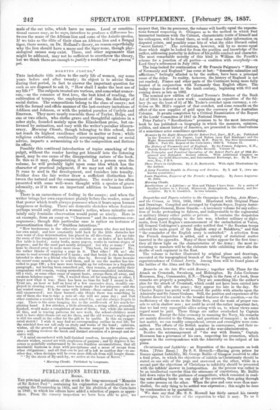MORNING ,CLOUDS. •
Tins indefinite title refers to the early life of women, say some /ears before and after twenty ; its object is to advise them during that period, in fact to answer the important question for such as are disposed to ask it, "How shall I make the best use of my life ? " The subjects treated are various, and somewhat numer ous,—as the romance of first love, the best kind of reading, the cultivation of temper, the employment of time, the discharge of social duties. The compositions belong to the class of essays ; not with the formal and effete manner of the last-century imitations of Addison and Johnson, or with the pointed paradox of Carlyle and Emerson. They more nearly resemble those of Taylor, Helps, and one or two others, who clothe grave and thoughtful opinions in a sober style, founded mainly upon the Elizabethan prose, but enlivened 'by animation, and racy with the writer's peculiar idiosyn oracy. Morning Clouds, though belonging to this school, does not reach its highest excellence either in matter or form ; while religious exhortation, continually accompanying moral or social advice, imparts a sermonizing air to the composition and flattens its effect.
Possibly this continual introduction of topics smacking of the pulpit, without the reader having got himself into the listening mood, may be one cause of the disappointing nature of the book. Be this as it may, disappointing, it is. Let a person open the volume, he will probably light upon some idea which has the character of practical judgment, if we may not call it wisdom. It runs to seed in the development, and vanishes into tenuity. Neither floes the fair writer draw a sufficient distinction between the natural and the commonplace. The reader is too often presented with some well-worn thought with a species of grave solemnity, as if it were an important addition to human knowledge.
There is an earnestness of feeling in the essays ; and when the -writer brings her own experience plainly before the reader, some of
that power which truth always possesses when it bears upon human happiness or feeling. There are domestic sketches whose features perhaps would only attract a woman's notice, whose minutite cer tainly only feminine observation would paint so nicely. Here is an example, from an essay on " Clearness " and its numerous consequences ; though this particular ease is rather an instance of procrastination than of "fruitless intentions."
"How burdensome is the otherwise amiable person who does not know her own mind ; and how constantly hold back by the little obstacles her
own want of clear determination has placed in all directions. Let me take the room of this imaginary martyr to indecision as an index of her habits. Her table is loaded ; ninny books, many papers, works in various stages of progress ; and for the most part neatly arranged : but why so many ? Can
none be cleared away to make more room ? This book, for instance ? No; she rather thinks of copying a page in it. That other ? Oh no ! she
means to read several chapters of it again ; and that beside it she has always
intended to show to a friend who lives close by. Several lie there because she meant some months ago to read them, and in one the marker has tra
velled to page 120; a few more were brought up for reference to a forgotten paragraph; not having been consulted yet, they remain, as probably their companions will remain, vexing mementoes of unaccomplished intentions,
till a visit, or some other cause of urgent haste, sweeps them all away, and awakens helpless regret. Oh, I wanted them all for something or other, I forget now what it was : there has been no time for half I meant to do.'
Trust me, an hour or half an hour of a few successive days, steadily em ployed in clearing away, would have been ample for her purposes—and she has wasted many. It is the same with letters—these cannot he put away, still unanswered ; nor those burned--she thinks there was something in
one of them she was to take a note of—she will see some day ; and that other contains a receipt which the cook asked for, and she always forgets to copy. There is the same hanging lire in the needlework of her much-be
ginning hand. A few stitches, a little alteration, a string added, grounding -finished, Would make a completion of most of them; but, while she intends
all this, and is treeing patterns for new work, the school-children must
wait to have shirt-fronts cut out for them, and the old wonnues night-gown is still too small in the collar for the gift to be usable. Is this an exagge rated sketch? I wish it may find no corresponding outline in real life, for the mischief does not tell only on study and works of the hand; opinions, wiahea, all the growth of personality, become merged in the same confusion; nothing receives the finish and distinct attention of a prompt and decisive will.
"A mind encumbered with half-finished resolves, incomplete plans, and obscure wishes, cannot act with singleness of purpose ; and by degrees it be comes so painfully embarrassed by its own fruitless accumulations, that all inevitable business is done with precipitance and a sense of escape from other obligations ; and all that ran he put off is left to another day—to another day, when decision will be even more difficult from still longer disuse. "'By the street of By-and-by, we arrive at the house of Never.'"
Morning Muds. Published by Longmans.


































 Previous page
Previous page